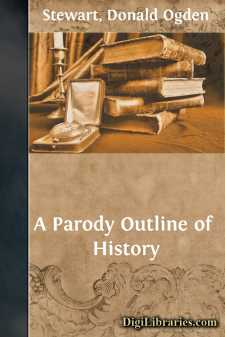Categories
- Antiques & Collectibles 13
- Architecture 36
- Art 48
- Bibles 22
- Biography & Autobiography 813
- Body, Mind & Spirit 142
- Business & Economics 28
- Children's Books 15
- Children's Fiction 12
- Computers 4
- Cooking 94
- Crafts & Hobbies 4
- Drama 346
- Education 46
- Family & Relationships 57
- Fiction 11828
- Games 19
- Gardening 17
- Health & Fitness 34
- History 1377
- House & Home 1
- Humor 147
- Juvenile Fiction 1873
- Juvenile Nonfiction 202
- Language Arts & Disciplines 88
- Law 16
- Literary Collections 686
- Literary Criticism 179
- Mathematics 13
- Medical 41
- Music 40
- Nature 179
- Non-Classifiable 1768
- Performing Arts 7
- Periodicals 1453
- Philosophy 64
- Photography 2
- Poetry 896
- Political Science 203
- Psychology 42
- Reference 154
- Religion 513
- Science 126
- Self-Help 84
- Social Science 81
- Sports & Recreation 34
- Study Aids 3
- Technology & Engineering 59
- Transportation 23
- Travel 463
- True Crime 29
A Parody Outline of History
Categories:
Description:
Excerpt
INTRODUCTION
A CRITICAL SURVEY OF AMERICAN HISTORY
In the Manner of William Lyon Phelps
On a memorable evening in the year 1904 I witnessed the opening performance of Maude Adams in "Peter Pan". Nothing in the world can describe the tremendous enthusiasm of that night! I shall never forget the moment when Peter came to the front of the stage and asked the audience if we believed in fairies. I am happy to say that I was actually the first to respond. Leaping at once out of my seat, I shouted "Yes—Yes!" To my intense pleasure the whole house almost instantly followed my example, with the exception of one man. This man was sitting directly in front of me. His lack of enthusiasm was to me incredible. I pounded him on the back and shouted, "Great God, man, are you alive! Wake up! Hurrah for the fairies! Hurrah!" Finally he uttered a rather feeble "Hurrah!" Childe Roland to the dark tower came.
That was my first meeting with that admirable statesman Woodrow Wilson, and I am happy to state that from that night we became firm friends. When Mr. Wilson was inaugurated in 1913 I called on him at the White House, taking with me some members of my Yale drama class. Each one of us had an edition of the president's admirable "History of the American People", and I am glad to say that he was kind enough to autograph each of the ten volumes for all of us.
Early in Mr. Wilson's second term as president, just before the break with Germany, I was sitting in the quiet of my library rereading Browning's "Cristina". When I came to the third stanza I leaped to my feet—the thing seemed incredible, but here before my eyes was actually Browning's prophetic message to America in regard to the submarine sinkings.
"Oh, we're sunk enough here, God knows! But not so sunk that moments—etc." It is an extraordinary evidence of the man's genius that in 1840 he should have perhaps foreseen prophetically the happenings of seventy-six years later! Not only did Browning seem to know what was bound to happen, but he told us the remedy. I sat right down and wrote to my good friend the president, enclosing a marked copy of the poem. On the sixth of April, 1917, war was declared.
May 7, 1912, was the one hundredth anniversary of the birth of Robert Browning. On that memorable date I was traveling to Ohio at the request of my dear friend Miss Jones to deliver an address at the Columbus School for Girls. Curiously enough the name of my Pullman car was Pauline. Not only did that strike me as remarkable, but I occupied upper berth number 9 in car 11, two numbers which, added together, produced the exact age at which Browning published the poem of that name. At once I recited the opening lines, "Pauline, mine own, bend o'er me—thy soft breast shall pant to mine—bend o'er me," to the porter.
I like to believe that the spirit of Browning arranged that entire journey, for the other occupant of this well-omened berth was that admirable statesman Warren G. Harding. When I sat down I noticed that he was reading Henry Sydnor Harrison's "Queed", a book which was justly popular at that time....



